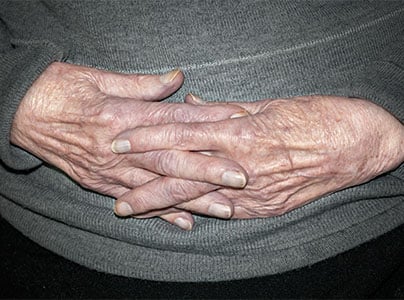Recipes
Osteoarthritis is a form of arthritis involving a breakdown of cartilage in the joints primarily but also affects the surrounding bone and soft tissue of the joint.

Osteoarthritis (OA) is the most common form of joint disease in the U.S., affecting millions of men and women, primarily persons older than 50 years old. The most common joints to get OA are the knees, although it can involve the hands, hips, and many other joints. It is estimated that approximately 14% of persons in the U.S. will develop knee OA in their lifetime,1 and this risk goes up to 24% or higher for those who are obese. Those with OA typically experience the following symptoms:
The cause of OA is not fully understood, however, patterns have emerged, showing us that it is a product of both local trauma (well known) and systemic factors (less understood). Trauma to joints from repetitive movements over the years, being overweight (putting more pressure on joints), and injuries, as well as muscle and bone weakness leading to imbalanced wear on the joints can all lead to more wear on the cartilage. On the other hand, systemic factors such as low antioxidant intake, vitamin D deficiency leading to weaker bones, and overall low micronutrient (vitamin, mineral, and phytochemical) intake from a poor diet can all speed up the damage in the joints with a slower recovery time even from normal activity. Drinking soda and other sugary drinks2 and not eating enough antioxidant nutrients found in fruits, vegetables, and nuts and seeds seems to be connected to a higher risk of OA and worse progression.3 So, a Nutritarian lifestyle, including staying fit and at a healthy normal weight, are important strategies in the prevention of OA. Many people have reported a Nutritarian diet-style has resulted in resolution of their osteoarthritis symptoms. This is largely due to the anti-inflammatory effects and restoration of blood perfusion and nutrient return to the joint capsule and cartilage.
The following are sample questions from the Ask the Doctor Community Platinum and higher members can post their health questions directly to Dr. Fuhrman. (All members can browse questions and answers.)
If someone is sensitive to nightshades and notices it worsens osteoarthritis, is it possible that after following a strict Nutritarian diet for some length of time they could lose this sensitivity to nightshades and be able to consume them again without ill effect?
A small percentage of people have sensitivity to nightshade vegetables and can experience joint pain, digestive disturbance, or other symptoms, and yes, it is possible to diminish the sensitivity over time as gut microflora normalize and antioxidant status improves. What is more likely is that the sensitivity to nightshades will decrease enough so you can eat small amounts of them without difficultly, but it still would be wise to avoid large amounts at one time.
I’ve been following a Nutritarian diet for a while, but unfortunately, I have been unsuccessful with getting my parents to make significant changes.
My mother is 63 and overweight and she also has osteoarthritis. She occasionally diets and loses weight but she works long hours and loves sweets, especially ice cream, so her weight always bounces back up. Can you recommend both vitamins and specific foods I should encourage her to eat to reduce the effects?
She’d be willing to take vitamins and eat more of certain things, but she’ll likely never eat solely Nutritarian.
Many people never thought they could do without sweets and junk food but they find that as they continue to eat healthfully, they lose their desire for these foods. As she becomes lean with a Nutritarian diet, inflammation and tissue injury will diminish. It’s the entirety of the Nutritarian diet, not a specific food that will be most healing. My experience has been that attendees at my Health Getaways learn so much compelling information, while being served delicious buffets of gourmet food, and leave with a heighted motivation to eat healthfully forever. Even those participants who were not willing to eat so healthfully, accompanying a spouse, wind up with a new outlook. Nevertheless, the three basic things I suggest all people with various dietary patterns do are:
Lastly, eat G-BOMBS regularly, Greens, Beans, Onions, Mushrooms, Berries, Seeds (flax, chia)
I have arthritis in my hands that just started, and I am wondering if it is possible to reverse this? What is the cause of arthritis, so I can be sure to stop its progression?
It could be osteoarthritis or the autoimmune type of arthritis, called rheumatoid arthritis. A physician could examine you, perform blood work, and clarify the diagnosis. If you are dealing with osteoarthritis, this is a common inflammatory condition which will improve with a Nutritarian diet rich in phytonutrients and anti-inflammatory compounds. A diet high in animal protein has been associated with an increased risk of osteoarthritis as well as autoimmune-related rheumatoid arthritis.
Both types of arthritis can improve and even resolve if addressed with superior nutrition in the early stages. My book, Super Immunity, contains the specific information you need to take charge of your health and get well again from immune system related disorders.

Once unable to work due to arthritis, Gayle is back on the job and lost 58 pounds... Read More
Results may vary.

Janice's chronic, disabling neck pain is gone and for the first time in years she hasn't had a cold or bronchitis during the fall/winter... Read More
Results may vary.
Maria lost 64 pounds and her arthritis is greatly improved... Read More
Results may vary.